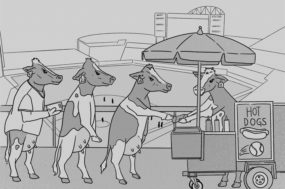Never was my observation “It’s easy to be green when it’s not personal,” more obvious than today. As population increases and suburbanization encroaches on previously rural countryside, each new settler or squatter must face their own deleterious impact on the environment.
Most people do not have the luxury or the desire to buy 90 acres, build a house in the corner and leave the rest as a prairie dog town. It’s easier to buy or build a house on a lot in a development that has already been cleared and zoned residential. Kiss the prairie dog, coyote, spotted owl, spikedace, minnow, wetland and farmer or rancher habitat goodbye. Out of sight, out of mind.
When the developer and city council rezoned and annexed the development, they based their decision on what was personal to them – money and tax receipts.For the new homeowner, any “guilt or concern” they might have had over their personal impact is simply out of sight, out of mind. Yet, it is often these same “Now that I’ve got mine, I draw the line!” newcomers that support the stringent, sometimes justified but often frivolous restrictive edicts on others’ private property.
It’s a good system. The new homeowner can feel good about funding the Sierra Club or Wildlife Defense Fund, the developer moves to the next farm to begin again and the city manager gets a better job in another state. Not to mention the farmer that sold out. He can retire and move into a new suburban development closer to the grandchildren or the golf course.
I think of it as the inexorable roll of civilization. It gobbles up the land and has since the pilgrims bought Manhattan for a string of beads and a lotto ticket.
There is one public figure who has steadfastly reminded us of our hypocrisy. He walks the walk and talks the talk – Mr. Ralph Nader. Republicans don’t like him because he attacks big business. Democrats don’t like him because he cost Al Gore the 2000 election. Republicans can’t buy him off, and he peels the green veneer off Democrats.
I don’t know how Mr. Nader feels about relocating prairie dogs (the carbon offset of the wildlife displacers) or global warming, nuclear power, modern agriculture or condemning productive land to protect a minnow.Where does environmental protection end and consumer protection begin?
All I know is that as time goes by, his wisdom humbles me. PD




